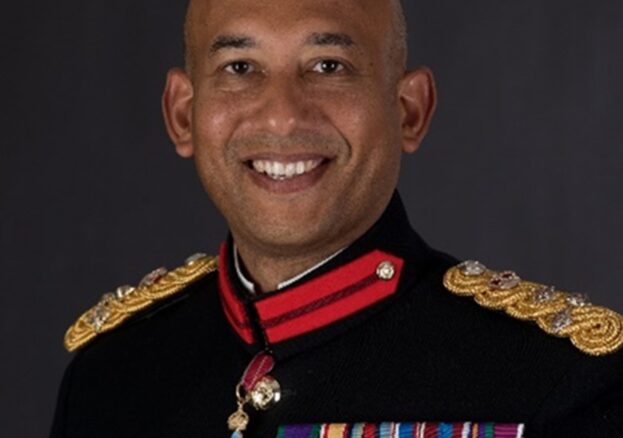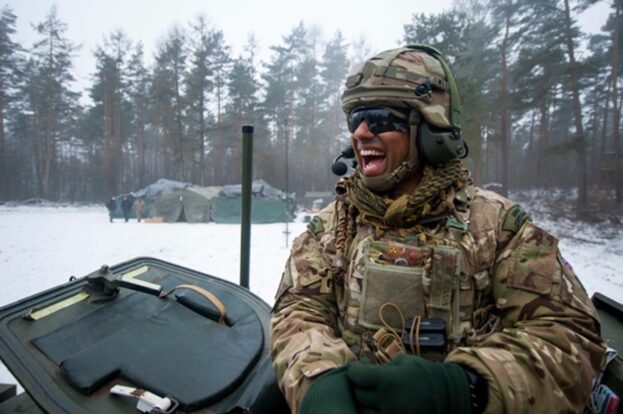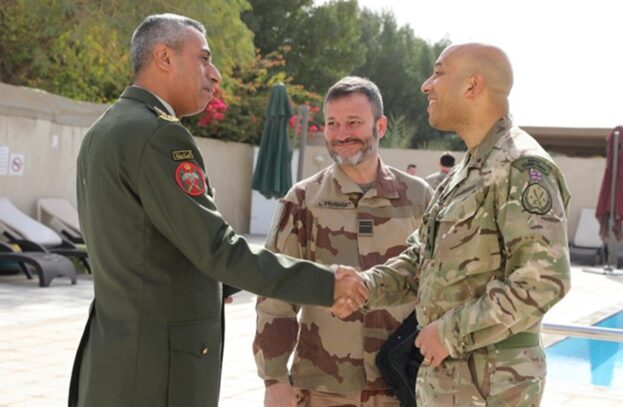
Brigadier Harris CBE, a British-born leader with roots in India and the West Indies, exemplifies success from a multicultural background. He takes immense pride in his military heritage; his maternal grandfather served in the Indian Army’s esteemed “Fighting Cock Division,” and his father began his career in the Jamaican Defence Force before becoming a Commando-trained soldier in the Royal Artillery, retiring as a Warrant Officer. Brigadier Harris is recognized as one of the first two Black one-star officers in the British Army, further highlighting his pioneering role.
Despite this rich military background, Brigadier Harris’s entry into the Army was not straightforward. Growing up as the son of a serving soldier, he initially aspired to study law or architecture. Many individuals from his community are unaware that they can join the Army directly as officers, a misconception he faced. This led him to enrol at Welbeck Defence Sixth Form College, which offered a pathway to Sandhurst.

Reflecting on a pivotal moment early in his career, Brigadier Harris, then a Lieutenant, recalls a soldier’s death by drowning under his command due to an unfortunate accident while stationed in Sardinia. “One would go back a million times to change that. In our line of work, risk is inherent, with injury and even fatality possible. Our role as leaders is to mitigate risk as far as we can, whilst recognising that on operations our people have to deliver. Including in combat.” This profound understanding of service and leadership offers insight into his success. He emphasizes the value of difficult conversations, active listening, and empathy—lessons learned from his parents and others through military service.
Currently serving as the Director of the Land Command and Staff College, Brigadier Harris has commanded at various levels within the 26th Regiment Royal Artillery and the Army Training Regiment (Pirbright), as well as in the 4th and 29th (Commando) Regiments Royal Artillery. His extensive operational experience spans the UK’s Permanent Joint Headquarters, Joint Warfare, and US Central Command, including multiple tours in the Middle East and Afghanistan. Most recently, he served as the Deputy Commanding General of the Global Counter-Daesh Coalition’s Combined Joint Task Force, earning the United States Legion of Merit. He values these experiences for the teamwork and selfless professionalism they foster across the Services.

Beyond his operational roles, Brigadier Harris is proud to have established the British Army’s Black, Asian, and Minority Ethnic Network, now known as the Army Multicultural Network. This initiative aims to inform, inspire, and empower all service personnel to realise their potential and contribute fully. The network was inspired by conversations regarding representation within the Army, particularly in light of the impending retirement of Colonel (Retired) Andy Allen, the first Black officer to attain full Colonel rank. Brigadier Harris recognised the need for more diverse representation within the Army.
In collaboration with the Army Race Champion and co-founder Captain (Retired) Steven Henry, the Network has successfully supported Service personnel in realising their potential and enhancing cultural appreciation and inclusion within the Army. While acknowledging the progress made, Brigadier Harris emphasises that more work is necessary. The Network has elevated conversations around diversity and created an atmosphere of optimism. Its legacy includes Project Tull, named after Walter Tull, the first Black officer to lead White British soldiers in World War One. This project has inspired Army leadership to address disparities in race and talent utilisation, though Brigadier Harris insists, “We need to move further and faster than we have in the last five years. I see clear determination in the British Army’s senior leaders to do so, and know we have the talent and professional drive across all ranks to achieve our goals.”
Brigadier Harris envisions a future British Army that reflects the diversity of British society: “To succeed, we must draw on the best talent available and create opportunities for everyone.” He advocates for collaboration with various societal sectors and political leaders to ensure the Army remains representative. He highlights the phrase “See, believe, do” as central to this vision—one where minoritised groups, including ethnic minorities, women, and the LGBTQ+ community, feel welcomed and empowered. While this vision is in the process of being realised, the Army Multicultural Network and the Chain of Command have important work ahead.
